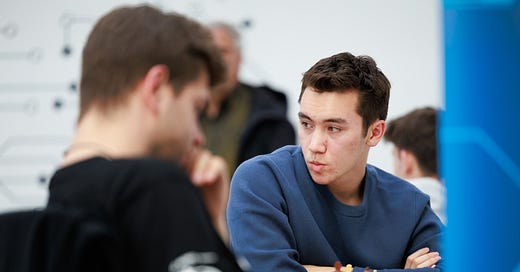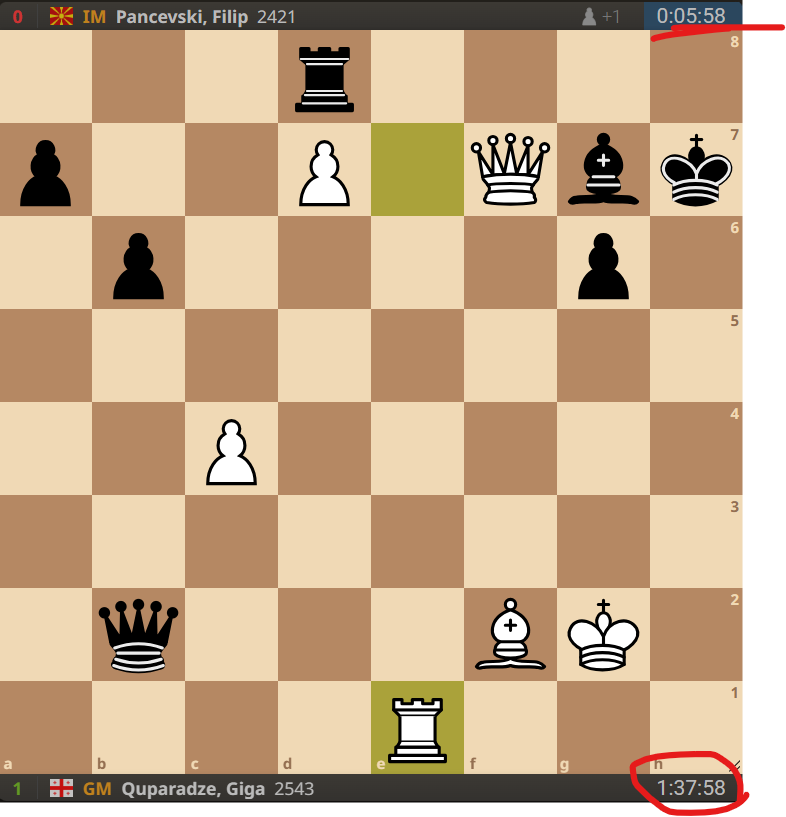Recently, I spent three weeks in Europe — from mid April to early May, where I played in three open tournaments.
Having played most of my chess in Australia in the last few years, I was pretty excited by the prospect of having the opportunity to play tournaments where I would be a small fish in the ocean, as opposed to being the big fish in a small pond.
This is without a doubt the most classical chess I’ve ever played in such a condensed period. And while the results didn’t quite match my expectations, the experience taught me a lot.
Here are the 7 biggest lessons I took away:
#1: Humility
I find it a bit embarrassing to be writing about my recent chess trip.
I’ll be honest — my expectation was I was going to train extra hard for a few months, rock up to some open tournaments in Europe, and gain 100 or so rating points… because “Europeans are overrated”, which is up for debate.
My best tournaments in the past have always been when I was working hard on the game, but in the back of my mind I had no real expectations of a particular performance, or rating gain.
This time, I fell back into old habits and started stressing too much over attaining particular outcomes. Despite all the hours and thought I put into training, I ultimately overestimated where my game was at, and put too much pressure on myself to deliver results.
I was even starting to project out what my overall rating gain would be from the trip, if I kept performing at the level I was — which five games into the trip, would’ve been over +100.
Yeah, things didn’t quite pan out.



#2: European Standard of Openings
One thing that I really felt playing in Europe, was that the standard of openings was just much higher compared to what I was used to.
I would say my openings are generally a strong point, but my impression is that players in Europe have a much more ‘professional’ approach to their openings.
In quite a few White games, I was struggling to get any advantage — even against some lower rated players. And with Black, I found myself in a few pretty uncomfortable positions relatively early on.
Outside of Europe, its actually not that uncommon to see even IMs who have pretty lacking theoretical opening knowledge, and are basically winging it in half of their games.
In Europe, with a player of the equivalent strength — that would be a pretty rare sight to see.
#3: The Giga Quparadze Strategy
About a month or two before I flew to Europe, I heard for the first time of this Georgian GM named Giga Quparadze.
Some of you may be familiar, but I imagine for most, the name does not mean much.
The guy is not an elite player by any means, usually he’s around the 2500s (still strong ofc). But the style in which he wins games is remarkable.
I’ll let the screenshots speak for themselves:
These games are not outliers, this is just normal everyday life for the guy.
Up until I witnessed the manner in which Giga would win games — by consistently putting pressure on the clock — I wouldn’t have legitimately considered playing in such fashion to be “real chess”.
But there is a real point to the way he plays, and I truly believe that most players could play quicker than they currently are, without sacrificing the quality of their play as much as they think they would be.
When I looked back at my results from the Singapore International Open last year, I realized 3/4 of the losses against higher rated opposition largely came down to overthinking & poor time management. Not getting outplayed necessarily — but overthinking, falling behind on the clock, and then blundering under time pressure.
It sounds obvious, but I believe a lot of players underestimate just how much of an impact that time trouble has on their results.
After starting to give much more conscious attention to this aspect of the game — and really emphasizing it through every game I sat down to play — it became apparent to me that even many decent titled players seem to not really give much attention to this, while only focusing on the pure quality of their moves.
Although I failed to beat any higher rated players during the entirety of the trip, I did draw 50% of the games I played against 2350+ opposition (-6 =6 +0), which I would actually attribute a fair amount to almost never being behind on the clock.
#4: Calculation
Tying into the last point — it’s a lot easier to play quickly when you can calculate quickly (and accurately).
I would attribute much of my improved time management to the sheer volume of calculation work I did in the months leading up to the trip.
If you get neglect training this area of the game, then you will be much more prone to double and triple-checking every little line you calculate — which overtime adds up on the clock (trust me, I’ve been there).
But strong calculation doesn’t just help with time management — it helps with survival. In several games, I was under serious pressure, and being able to calculate well, while not devolving into a nervous wreck was incredibly important. Good calculation can be the difference between a loss and a draw.
Many often think of calculation as solving some flashy “White to play and win” puzzle. But in practice, some of the most important calculations are those that save the half-point when things may otherwise look bleak.
#5: Pre-game preparation
Tying in with some of the previous points — I’ve attempted in trying to take on a much more practical way of preparing for games, in comparison to my old ways of doing things.
Back when I was a junior, my preparation was relatively simple: check what my opponent plays, see where it intersects with my repertoire, and then more or less just plug away at engine lines for a few hours, without much intentional human thought.
While I still fall into these old patterns from time to time, I’ve made two key shifts that have helped a lot:
Studying the opponent, not just the opening lines
Instead of just looking at what openings they play, I try to build a broader picture of who my opponent is. Which types of positions do they like? Where do they struggle?
One small trick I started using — and I haven’t anyone else talk about this — is trying to find their games if they’ve been broadcasted online, which usually have accompanying timestamps, not just the moves. This way, as opposed to just going through a plain PGN, you can actually see how they managed their time, how confident they seemed in different types of positions, and how early they’re typically out of book.
Of course, this is not always possible, and for the average club player your opponent will have very few (if any) games broadcasted online.
Not always trying to play the ‘best’ opening lines according to the computer.
Don’t get me wrong — in most cases, you should be trying to play the best, most principled moves.
But it’s easy to get lost in a sea of computer analysis and forget to ask two very human questions:
Do I like and understand these positions?
How will my opponent feel about them?
Take the average KID (King’s Indian Defense) player. You might find some line where the engine says +1 for White — but your opponent is on the verge of launching their standard, yet brutal kingside attack. Do you really think they care what Stockfish says?
If you’re not liking the answers to both of these questions, then you probably should go back to the drawing board.
#6: Location
This might seem a bit random, but before planning this trip, I didn’t really care so much as to where they were actually being held.
I was just hungry to play in some strong events.
The idea of choosing events based on location — like factoring in whether I’d actually enjoy being there — honestly felt a bit ridiculous to me.
My mindset was basically “I’m not on vacation. I’m here to play chess.”
But after this trip, I’ve had a slight change of heart.
At the very least, I don’t think I’ll ever play a tournament on an island again.
It’s hard to put into words, but island life is almost too peaceful. I prefer the chaos of big cities. Even smaller towns are fine, at least they have some sense of civilization to grasp onto.
Anyways, rant over.
#7: A New Diagnosis
As alluded to earlier under #4, I previously had the impression that calculation was one of the biggest issues in my game.
However after this trip, I’m not so sure.
While my calculation was by no means perfect across the board (and it never will be), by and large I got the impression that it was not the thing that caused the most problems over the 27 games I had played.
Even when I should’ve been quite fatigued during the third event I was playing, I still felt I was calculating at a comparable level to how I was at the start of the trip, which I was pleased with.
Instead, it became apparent that my depth of strategic understanding was perhaps not on the level I may have liked to believe.
I told one of my friends this, and he said “yeah that’s a bit funny, because that’s what you’re kind of known for”.
When looking at the games I lost against stronger opposition from this trip — sure there were some games that could be attributed to lacking calculation. For the most part though, I found I was getting outplayed strategically, and on quite a few occasions just completely misevaluated certain positions.
It certainly had me thinking if I should’ve spent more time in the last few months working on this aspect of the game (as I devoted very little to it).
However, if I didn’t dedicate as much energy to calculation, then I would probably be here complaining about how my calculation is horrible instead.
To have new problems, you first need to solve old ones, I guess.
If you’re 1500+ online and looking to improve your game, and want to work with me 1-1, fill out this form.







There’s a book I read called The Zugzwang Method which stated “The trend of modern chess. Effective time management”.
Basically anyone who gets into time trouble is about 2-300 ELO worse. Seems similar to what you said